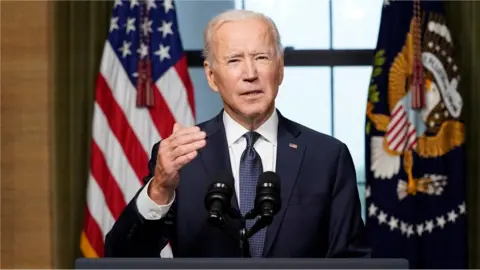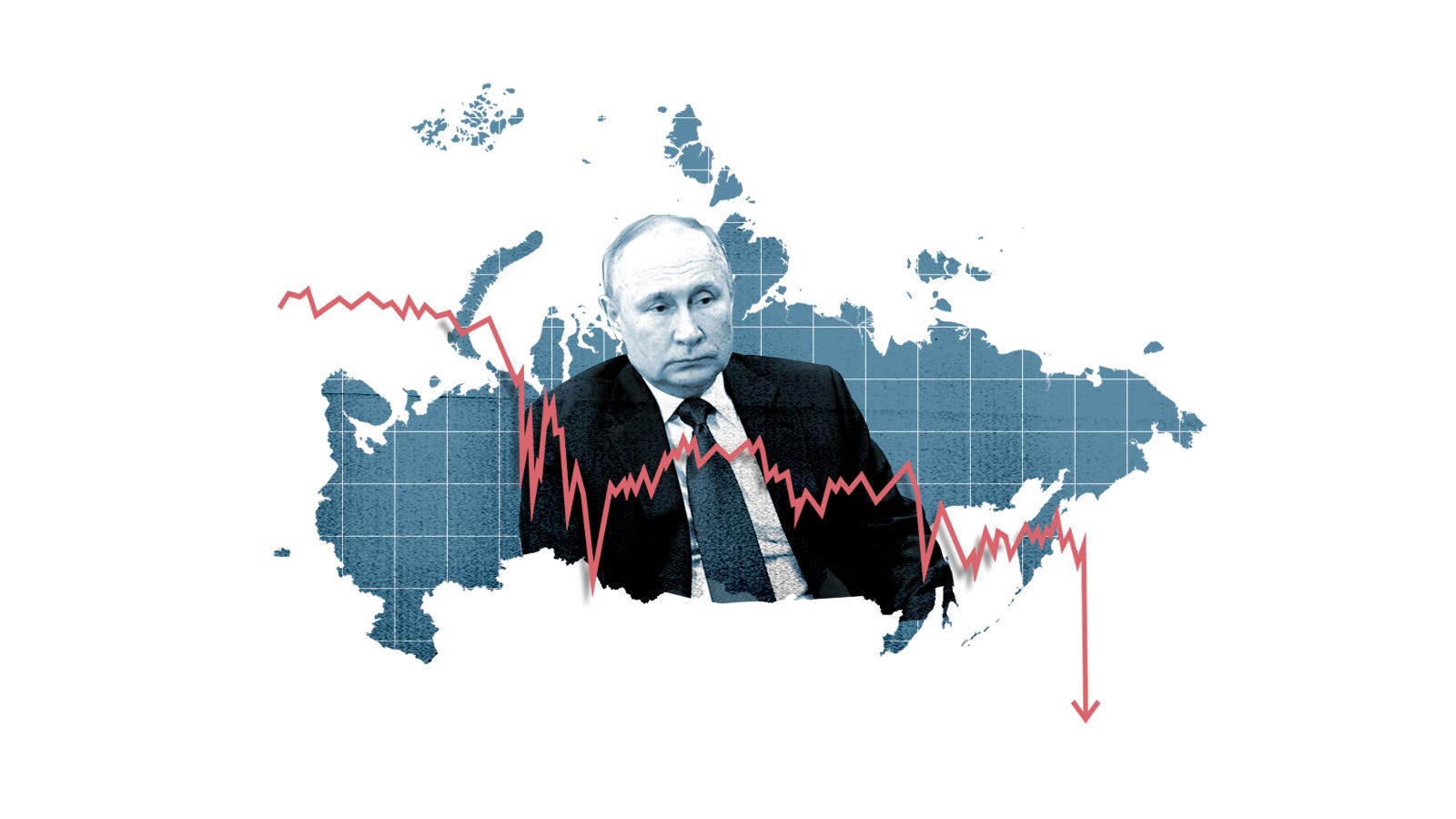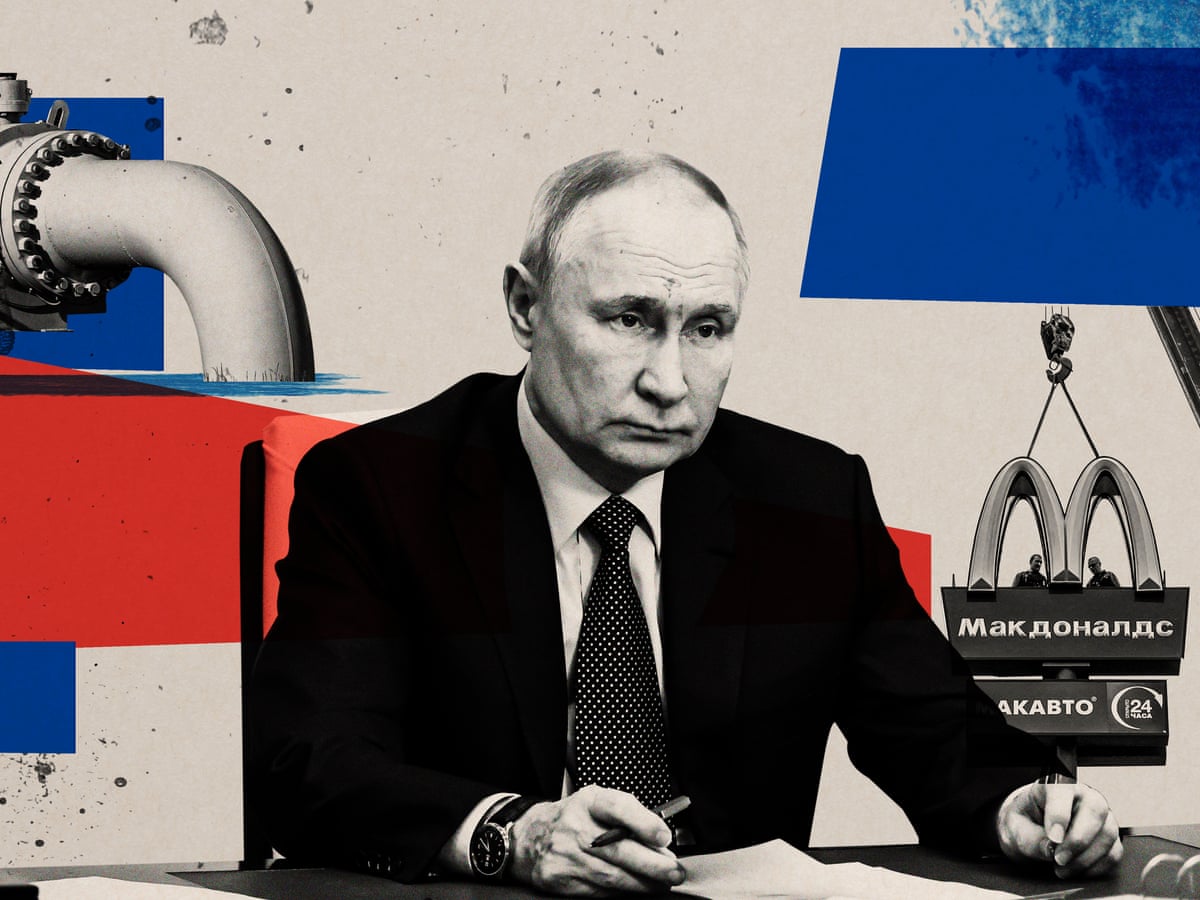U.S. To Impose “Hundreds And Hundreds And Hundreds” Of Sanctions In Russia Action For Navalny’s Death, “Putin’s War Machine” And Close Gaps In Existing Sanctions Regimes; Will They Work?
The United States is set to intensify its response with a significant wave of fresh sanctions against the backdrop of geopolitical tensions stemming from Russia's invasion of Ukraine. In an interview on Thursday, Deputy U.S. Treasury Secretary Wally Adeyemo unveiled plans to impose sanctions on over 500 targets, marking the second anniversary of the invasion. The move also comes after the tragic passing of Russian opposition leader Alexei Navalny. However, have the previous sanctions affected the Russian economy, and will the new sanctions deal the blow that the U.S. is looking to deliver to Russia?

On Friday, the United States will implement new sanctions on more than 500 targets, marking the second anniversary of Russia’s invasion of Ukraine, according to Deputy U.S. Treasury Secretary Wally Adeyemo in an interview on Thursday.
As Washington aims to hold Russia accountable for the conflict and the demise of opposition figure Alexei Navalny, the action, conducted in collaboration with other nations, will focus on Russia’s military-industrial complex and entities in third countries aiding Russia’s procurement of desired goods,
Adeyemo emphasized that while the U.S. will unveil numerous sanctions, it’s crucial to recognize that these measures are not solely taken by America.
The forthcoming sanctions add to the thousands already imposed on Moscow by the U.S. and its allies post-Russia’s 2022 invasion of Ukraine, which has resulted in significant casualties and extensive urban devastation.
Although uncertainties still surround additional security assistance for Kyiv’s pending approval by the U.S. Congress, these new penalties indicate the determination of the U.S. and its allies to sustain pressure on Russia.
President Joe Biden’s administration has already utilized previously allocated funds for Ukraine, and a request for further financial aid remains stalled in the Republican-controlled House of Representatives.
However, Adeyemo stressed the role of sanctions and export controls in impeding Russia’s military actions in Ukraine, spotlighting the necessity for Congress to act promptly to furnish Ukraine with essential resources and weaponry for self-defence.

Biden Consoles Family Of Russian Opposition Leader Navalny,
On Thursday, U.S. President Joe Biden met with the wife and daughter of Alexei Navalny, the Russian opposition figure who passed away last week in a prison camp, lauding him as “a man of incredible courage.”
Navalny, aged 47, became unconscious and subsequently passed away suddenly on Friday following a stroll at the “Polar Wolf” penal colony situated above the Arctic Circle, where he was serving a lengthy sentence, as stated by the prison service.
After the meeting with Navalny’s wife Yulia and daughter Dasha, Biden remarked, “He was a man of incredible courage, and it’s remarkable to see how his wife and daughter are embodying that spirit.”
Under Secretary of State Victoria Nuland announced on Thursday that among the “hundreds and hundreds and hundreds” of forthcoming sanctions, some would be directed at those deemed responsible for Navalny’s demise, while the majority would target “Putin’s war machine” and address loopholes in existing sanction frameworks.
The timing of these new measures coincides with the second anniversary of Russia’s full-scale invasion of Ukraine.
Preceding Biden’s remarks to the press, the White House issued a statement conveying the president’s “heartfelt condolences” to Navalny’s family.

Have Previous Sanctions Worked On Russia?
Even as the U.S. wants to impose new sanctions on Russia, the question is whether the previous sanctions had any substantial impact on Russia.
The answer – while sanctions have affected Russia’s economy, causing a 2.1% contraction in 2022 as per the Treasury Department, the country’s economic performance has surpassed predictions.
Despite perceived challenges by Moscow, the International Monetary Fund (IMF) anticipates a 2.6% GDP growth in 2024, a significant upgrade from the previous forecast, attributing it to robust growth in 2023.
However, IMF spokesperson Julie Kozack noted that Russia is transitioning into a “war economy,” characterized by increased military expenditures, government support to sustain consumption, and rising inflation amidst global economic downturns.
Sanctions Against Russia, Timeline
In response to Russia’s aggressive actions in Ukraine, the international community rallied to impose a series of targeted sanctions aimed at crippling Russia’s economy and pressuring its leadership to cease hostilities.
Here’s a breakdown of the sanctions imposed by various countries and blocs –
United States –
The U.S., in coordination with its allies, announced sanctions targeting Russia’s oil refining sector by implementing export restrictions on specific refining technologies.
The move aimed to hinder Russia’s efforts to modernize its oil refineries.
Additionally, the U.S. and its allies excluded some of Russia’s banks from the SWIFT international payments system, severely limiting its ability to conduct financial transactions globally.
Further sanctions include restrictions on a wide range of technologies crucial for Russia’s military operations, along with sanctions on Belarusian individuals and entities.
European Union –
The E.U. unveiled multiple packages of sanctions, including a ban on the export of certain refining technologies to Russia.
Measures also involve closing E.U. airspace to Russian aircraft, banning Russian state-owned media outlets like Russia Today and Sputnik, and freezing assets of Russian President Vladimir Putin and Foreign Minister Sergey Lavrov.
Additionally, the E.U. imposed import bans on various products from Belarus, a key Russian ally.

Switzerland –
Departing from its traditional neutrality, Switzerland declared its alignment with Western values by adopting all EU-imposed sanctions on Russian individuals and companies, including asset freezes.
Japan –
Japan announced strengthened sanctions against Russia, targeting financial institutions and halting exports of military-use goods like semiconductors.
Prime Minister Fumio Kishida emphasized Japan’s firm stance against any attempt to alter the status quo by force.
South Korea –
South Korea joined Western efforts to restrict Russian banks’ access to SWIFT and tightened export controls on strategic items.
The Korean government also pledged to support the international community’s sanctions for a peaceful resolution to the crisis in Ukraine, including measures to stabilize the energy market.
United Kingdom –
The U.K. announced plans to exclude Russia’s Sberbank from sterling clearing and impose sanctions on three other banks. Foreign Secretary Liz Truss declared a forthcoming full asset freeze on Russian lenders.
Canada –
Canada imposed additional sanctions on Russia, targeting 62 individuals and entities, including elite members and major banks. Prime Minister Justin Trudeau emphasized the severe costs these sanctions would impose on complicit Russian elites.
Canada also prioritized immigration applications for Ukrainians seeking refuge in Canada.
Czech Republic –
The Czech Republic banned Russian airlines from flying into the country and is exploring further measures against Russia. Prime Minister Petr Fiala highlighted the nation’s unique historical experience, making it more sensitive to Russian aggression.
Prague also expedited its exit from two Soviet-era international banks and initiated an analysis of Russian-owned companies’ access to Czech public funds.
Taiwan –
Taiwan announced sanctions against Russia, condemning the invasion of Ukraine and pledging to join democratic countries in imposing sanctions.
Premier Su Tseng-chang emphasized the nation’s commitment to robust export control rules.
Australia –
Australia expanded sanctions on Russia, targeting elite citizens and lawmakers deemed strategically significant to Moscow. Prime Minister Scott Morrison expressed concern over China’s easing of trade restrictions with Russia amid the crisis.
Additionally, Australia is collaborating with the United States to align sanctions on key Belarusian individuals and entities supporting Russia.
New Zealand –
New Zealand implemented targeted travel bans on Russia and prohibited trade with its military and security forces.
Prime Minister Jacinda Ardern condemned Russia’s actions, emphasizing the global condemnation of Moscow’s aggression and the potential loss of innocent lives.
:no_upscale()/cdn.vox-cdn.com/uploads/chorus_asset/file/23306690/how_putin_falls_board_2c.jpg)
The Viewpoint
The United States’ decision to impose fresh sanctions on Russia amid the ongoing conflict in Ukraine has sparked debates regarding their effectiveness in deterring Russian aggression and destabilizing its economy.
While sanctions have become a favoured tool of diplomatic pressure, their impact on altering the behaviour of targeted nations remains a subject of scrutiny and scepticism.
Hence, the new U.S. sanctions on Russia and their ability to inflict significant damage on the Russian economy need to be gauged –
1) Escalating Pressure -The latest round of U.S. sanctions signals a significant escalation in pressure on Russia, targeting key sectors such as banking, military exports, and oil refineries.
By restricting Russia’s access to critical technologies and financial systems, the U.S. aims to impose severe economic costs on Moscow and compel a change in its behaviour.
2) Economic Impact – While previous sanctions have undoubtedly inflicted economic pain on Russia, the extent to which they have altered its geopolitical calculus remains unclear.
Despite experiencing a contraction in GDP and facing challenges in accessing international financial markets, Russia has demonstrated resilience and adapted to mitigate the effects of sanctions.
3) Limitations of Sanctions – Critics argue that sanctions alone may not be sufficient to compel Russia to alter its course in Ukraine.
Moscow has shown a willingness to absorb economic hardships in pursuit of its strategic objectives, and the imposition of further sanctions may only serve to deepen Russia’s resolve and foster anti-Western sentiment domestically.
4) Unintended Consequences – There is also a risk that sanctions could have unintended consequences, such as worsening tensions between Russia and the West, spurring retaliatory measures, or driving Moscow closer to other adversaries.
Moreover, sanctions could impose collateral damage on innocent civilians and businesses, further straining diplomatic relations.
5) The Role of Diplomacy – While sanctions can serve as a tool of coercion, their effectiveness ultimately depends on the broader diplomatic context.




